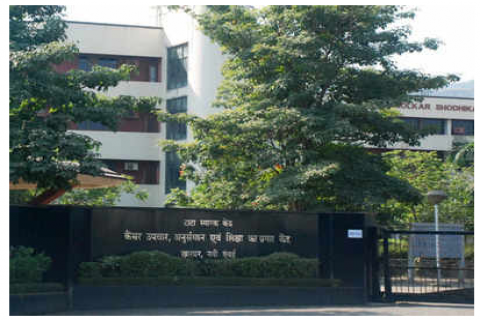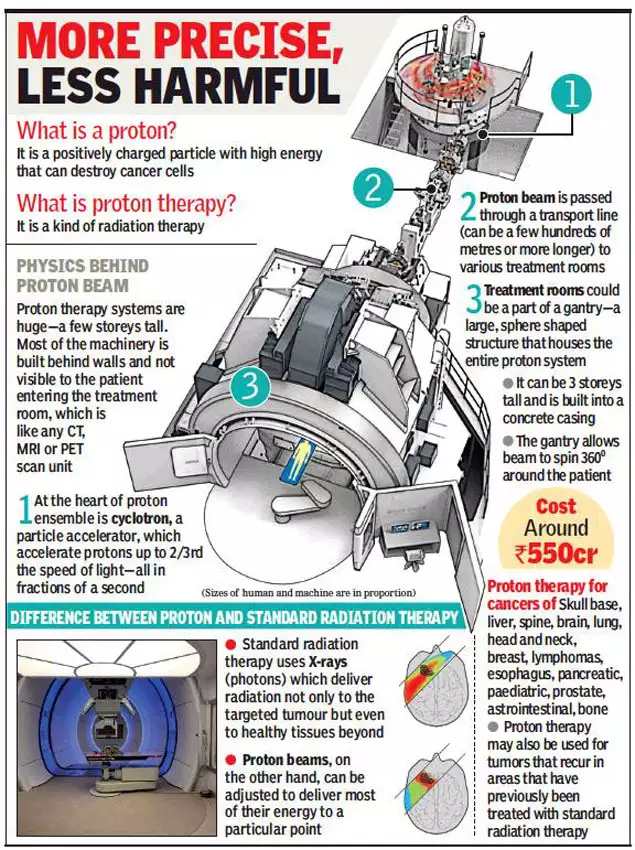Mumbai set to get hi-tech proton machine for safer cancer therapy

MUMBAI: One of the world’s most sophisticated forms of cancer treatment is coming to Mumbai. The proton beam therapy machine, which provides sub-millimetre precision in destroying cancer cells, is expected to be installed at Kharghar’s Tata Memorial Centre by September 2020.

The machine, of which there are barely 120 worldwide and one in India, will be made available to at least half the patients at one-tenth of what it costs in the US; a single cycle of treatment will still run up a bill of Rs 10-12 lakh though. However, those who cannot afford it will get free treatment. “…by September 2020, we should be ready,’’ said Dr Siddhartha Laskar, the radiation oncologist from Tata Memorial Hospital, Parel, overseeing the project.
Roughly, 50-60% of all cancer patients need radiation. Doctors say the proton beam is safer than standard radiation therapy performed using X-rays which have a tendency to pass through a body.
Kharghar centre to offer patients subsidised therapy
After Apollo Cancer Centre in Chennai, Kharghar’s Tata Memorial Centre will be second to offer proton beam therapy—one of the world’s most sophisticated cancer treatment—in the country and the entire Southeast Asia region.
Dr Rakesh Jalali, who heads the Apollo centre, said, “The proton beam can be regulated in such a way that the proton energy burst occurs at the precise site of the cancer, minimizing damage to surrounding healthy tissues.’’
Civil work to house the unit has been completed. The Tata beam will be the second such machine in the country and the entire Southeast Asia region. The first proton beam therapy machine located in Apollo Cancer Centre, Chennai, crossed a landmark recently: treating 100 patients from across the country and abroad, including the US and Saudi Arabia, over the last 11 months.
The proton beam has been around for over four decades, but the buzz around it is louder now because of a new pencil-beam variant that gives sub-millimetre precision in killing microscopic cancer cells. The number of centres across the world have almost doubled to over 120 in the last few years.
“Over the next five years, image-guided proton pencil beam therapy will be useful for 25% of all patients needing radiation,’’ added Dr Jalali. The doctor, who has used proton beam for hard-to-reach brain cancers, especially among children, has published over nine studies in the last 11 months to show that this therapy has worked for all his patients so far.
Dr Jayashree Upadhye, a gynecologist from Nagpur whose brain tumour recurred after almost seven years, was among the first few patients in the country to undergo proton therapy. “I was almost bed-ridden and couldn’t even move my fingers, but I am back at work after undergoing month-long proton therapy in February,’’ she said.
The proton therapy has its downsides. The proton ensemble costs Rs 550 crore, meaning the therapy is expensive. At Apollo’s Chennai centre, patients shell out between Rs 20 lakh and Rs 30 lakh for the entire course. ``Many cancer therapies, especially the new ones, are expensive,’’ said Dr Jalali. Bone marrow transplants for blood cancer patients cost between Rs 11 lakh and Rs 50 lakh depending on the genetic mutations and hospitals. Immunotherapy costs lakhs per month and CAR-T cell therapy can costs crores.
However, as Tata Memorial Centre works under the Department of Atomic Energy, it plans to subsidise proton beam therapy for patients. “Half the patients who need it will pay between Rs 10 lakh and Rs 12 lakh, while the remaining who have no economic means will get it free,’’ said Dr Laskar.
The proton therapy isn’t suitable to fight all cancers (see box). However, experts say beneficiaries can increase after extensive patients studies are carried out. As of now, there are few trained professionals to handle the technology.

